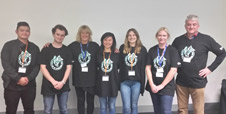
The Tairāwhiti team.
A University of Otago, Wellington interprofessional health team won the People's Choice Award in a competition which involved creating a healthcare plan for a client with complex needs.
The Tairāwhiti Interprofessional Programme (TIPE) team was taking part in the Interprofessional Health Team Challenge for the first time and had to come up with the plan for a man with Parkinson's disease accompanied by a host of other problems.
All the teams prepared before the competition, hosted by New Zealand Interprofessional Health Conference at Auckland University of Technology, but had to answer questions on the spot.
Other teams represented the Canterbury District Health Board (DHB), Counties Manukau DHB, the Auckland University of Technology, and Waitakere DHB, with the Canterbury DHB claiming the winning spot.
Christine Wilson, Tairāwhiti programme manager in the Department of Primary Health Care and General Practice in Wellington, says the first-time entry “was a significant learning curve for all — mentors and participants. It was a significant and enjoyable challenge.”
The competition is an internationally recognized interprofessional learning activity that promotes teamwork and collaboration among current and future healthcare professionals.
Otago's team represented several institutions and organisations — the team members were: Alex Govan, Dietetics (Otago); Ben Stegmann, Medicine (Otago); Aimee Milne, Nursing (Eastern Institute of Technology Graduate working at Turanga Health in Gisborne), Ly Dia Teh (Physiotherapy, Otago); Aaron Lim, (Pharmacy, an Otago graduate working at David Moore Pharmacy in Gisborne).
The Tairāwhiti Interprofessional Programme
The aims of the Tairāwhiti Interprofessional Programme — which has been operating for almost five years — include helping students to work in Māori health, collaborate in interprofessional teams, advocate for patients' involvement in any decision-making, and understand the rural health environment.
By the end of this year, 312 final year students from eight health professions will have come together in successive five-week rotations to do the programme.
The students live together at Gisborne Hospital or Wairoa Hospital during an experience that not only involves learning from their clinical tutors and programme leaders, but also from each other.